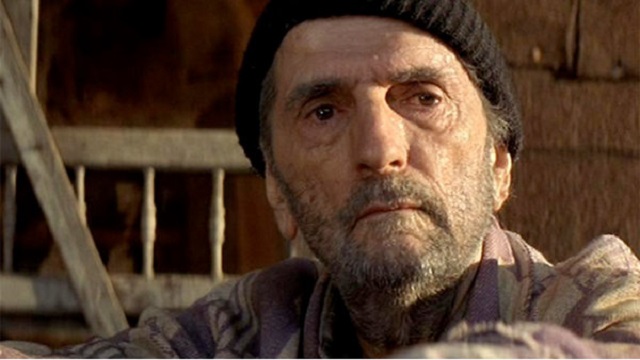The first time I saw The Straight Story, I cried.
I knew who David Lynch was, and had probably already tried watching Blue Velvet and Eraserhead in a pan and scan VHS format, both of which were neutered experiences. The Straight Story isn’t like either of those. It’s a singular work in Lynch’s filmography; it’s a G-rated Disney film with a singular story of coping with the past at the end of life.
Based on a true story, Alvin Straight (Richard Farnsworth in his final role) is a gentle farmer who is realizing he is getting on to the end of his life. He’s a proud man who dismisses people’s worries about him not being able to get off the floor for a day, but knows that the time is coming to finish everything he’s started. When he hears that his estranged brother Lyle (Harry Dean Stanton) is had a stroke, he knows he has to mend that relationship as best he can before he gives the Big Goodbye. Not being able to drive a car, and not being able to afford much of anything else, Alvin must ride a tractor from Iowa to Wisconsin as a pilgrimage to settle the receipts of his memories.
In real life, Richard Farnsworth had already been diagnosed with terminal cancer which had spread to his bones. Just like Alvin, Farnsworth was dealing with his own matters at the end of his life. The pain and paralysis within the movie are real as Farnsworth powered through the traveling film shoot that took place along the real route of Alvin Straight. Farnsworth and Straight seem to share a genuine desire to reconcile their life before they are sent to the Great Beyond. With little to no communication available on a tractor, there’s no promise that their desires will even be satisfied.
This movie belongs to Farnsworth, who carries it on his sizable shoulders, but all of the small parts are filled with genius actors. Kevin and John Farley appear as twin mechanics in the year after they lost their brother Chris. Sissy Spacek absolutely nails her role as Alvin’s daughter. But, it’s the pure brief role of Harry Dean that brings the house down. Already 73 at the time, Stanton brought the most knowing weight to Lyle’s reconciliation with Alvin.
I said this was an anomaly within Lynch’s filmography, and that’s no lie. It’s the only film he’s directed where he didn’t receive a credit on the screenplay; instead, the film was written by Mary Sweeney, who worked with Lynch as editor and producer on Twin Peaks and Lost Highway, and John Roach who worked as a producer at CBS. This screenplay, their first, captures the midwestern resolve with a simplistic perfection. Every line is simple and effective (“The worst part of being old is rememberin when you was young”), only to be heightened by Farnsworth’s honest delivery.
Though still recognized by Lynch’s fanatics, The Straight Story is a film that frequently gets lost in most cinematic conversations. I haven’t figured out what was in the water for the movies in 1999, and I don’t know why that year had so many great midwestern slices of life (along with October Sky and The Iron Giant). But, The Straight Story is one of the most honest experiences committed to celluloid.


